買車降價(稅)3萬,5萬,甚至10萬的優惠,
在經濟衰頹的時代,這些優惠都不是購車的好誘因,
大環境不佳,除非買了車可以幫助於事業工作上,讓您多賺點錢外,
購車,尤其一大筆支出,分期購買等等消費行為,應多加考慮.
一般,一部車50-90萬元,不但天天要花錢養它,而且天天折損減少其價值,
景氣不好,要花多少時間什麼時候才可以再賺回來50-90萬元?
是不是,要好好的考慮一下下??
沒車就沒車;有車當用則繼續用,過上一陣子再說.
有人要您增加消費,來刺激經濟指標提升,
當景氣的熱氣旋上升之際,您是不是還有能力爬上去,隨之上升?
還是,您只是當所謂景氣回春的馬前卒?然後,眼睜睜望著人家升上去?
您,依然趴在經濟的谷底?
留住您儘可能的所有力量,等待景氣好轉的時候,順勢而為,獲利可能以倍數計.
景氣蕭條之後,是財富重分配之始.
在經濟衰頹的時代,這些優惠都不是購車的好誘因,
大環境不佳,除非買了車可以幫助於事業工作上,讓您多賺點錢外,
購車,尤其一大筆支出,分期購買等等消費行為,應多加考慮.
一般,一部車50-90萬元,不但天天要花錢養它,而且天天折損減少其價值,
景氣不好,要花多少時間什麼時候才可以再賺回來50-90萬元?
是不是,要好好的考慮一下下??
沒車就沒車;有車當用則繼續用,過上一陣子再說.
有人要您增加消費,來刺激經濟指標提升,
當景氣的熱氣旋上升之際,您是不是還有能力爬上去,隨之上升?
還是,您只是當所謂景氣回春的馬前卒?然後,眼睜睜望著人家升上去?
您,依然趴在經濟的谷底?
留住您儘可能的所有力量,等待景氣好轉的時候,順勢而為,獲利可能以倍數計.
景氣蕭條之後,是財富重分配之始.
有人說過:〔凡走過下必留下痕跡〕
也有人留下智慧的語言;〔吉凶未到先有兆〕〔山雨欲來風滿樓〕.
歷史不一定會重演,就是可供為重要研判資料.
談談股市下跌中的止跌,或者反轉向上的信號,或許可以幫到人家.
股市一些簡單又扼要的止跌徵兆,僅供大家參考參考,只是,不負任何責任!
股市股價不但是經濟因素,也有摻合太多的人性心理和人的行為模式.
股市小波段下跌 (3-40交易日下跌15%左右),看到量價背離,接著暴量大漲,
應該是反轉的起漲點.
量先價行,是任何商品市場第一準則,也是大家所熟知而常常淡忘的準則.
中波段下跌 (6-70交易日下跌25%左右),在第二批次的追繳融資,斷頭殺出,
清洗浮額,融資減少幅度大於大盤下跌幅度,
讓股票從散戶慢慢的移轉到主力大戶的手上時,
(這也是散戶大多佔在輸方的原因)
應該是反轉向上的契機,是進場長期持有的時機.
中波段小波段下跌,大都非經濟之因而造成的,
例如國際某地區突發戰爭,恐怖攻擊,及發生天災....等等.
股市在某一段時間內,下跌超過30%,即〔空頭市場〕條件成立,
〔空頭市場〕會一而再的連續發生利空消息,壞消息一個一個接踵而來,
怎麼補,怎麼救,似乎無效,只是緩跌代替重跌,而難以止跌.
也就難以預測底部在那裡,
〔空頭市場〕中,偶有利多急拉上漲的一兩天,那是逃命波,卻也是空手的陷阱,
漲完了一小波段,接著又是跌跌不休,綿綿無期的一跌再跌.
〔空頭市場〕不但難測底部,也無法預判跌勢的時間有多少,
短則至少半年,多則兩三年以上,就是跌多漲小.
〔空頭市場〕初期,是大型公司垮掉了,尤其是績優大型股引爆,牽引下跌趨勢,
如何結束空頭市場呢,遙遙無期嗎?當然有其徵候,
當長期一跌再跌,最後,接著爆發一連串好幾家中小型股被掏空,大股東股票質押不足被拋售........
即所謂地雷股,
幾乎是同時的先後爆炸開來,衝擊股市再一次重跌,人心更加煌恐,買氣不振,
這可能就是結束空頭市場的時候了,
結束空頭市場不會反轉直上,會橫向整理好一段時間.至少整理30-60天,
讓主力吃足了份量,就會慢慢拉上來.
要拉上來恢復到起跌點位置,要好長好長的時間,或許一年,或許兩三年.
所謂〔多頭市場〕就把上述空頭市場反推回去,就沒有錯.就是一個反面的樣.
當多頭市場成立,利多一個接一個來,持股漲了,沒有漲停板似乎還不太開心.
恢復證交稅,加碼存款利息,加稅,放寬放空條件,放寬漲跌幅...
等等如何壓抑,仍然無法抵擋漲勢 .
〔多頭市場〕當然也有開始和結束的徵兆.多注意就可以看得出來.
股海浩瀚,千變萬化.也不是這樣簡單的敘述可以囊括.
只是個人長期觀察及個人經驗,提出一個概念,一個方向,
相信網上大大精明幹練,當可領會個中意境.
若有錯誤,不足,尚請指正!
也有人留下智慧的語言;〔吉凶未到先有兆〕〔山雨欲來風滿樓〕.
歷史不一定會重演,就是可供為重要研判資料.
談談股市下跌中的止跌,或者反轉向上的信號,或許可以幫到人家.
股市一些簡單又扼要的止跌徵兆,僅供大家參考參考,只是,不負任何責任!
股市股價不但是經濟因素,也有摻合太多的人性心理和人的行為模式.
股市小波段下跌 (3-40交易日下跌15%左右),看到量價背離,接著暴量大漲,
應該是反轉的起漲點.
量先價行,是任何商品市場第一準則,也是大家所熟知而常常淡忘的準則.
中波段下跌 (6-70交易日下跌25%左右),在第二批次的追繳融資,斷頭殺出,
清洗浮額,融資減少幅度大於大盤下跌幅度,
讓股票從散戶慢慢的移轉到主力大戶的手上時,
(這也是散戶大多佔在輸方的原因)
應該是反轉向上的契機,是進場長期持有的時機.
中波段小波段下跌,大都非經濟之因而造成的,
例如國際某地區突發戰爭,恐怖攻擊,及發生天災....等等.
股市在某一段時間內,下跌超過30%,即〔空頭市場〕條件成立,
〔空頭市場〕會一而再的連續發生利空消息,壞消息一個一個接踵而來,
怎麼補,怎麼救,似乎無效,只是緩跌代替重跌,而難以止跌.
也就難以預測底部在那裡,
〔空頭市場〕中,偶有利多急拉上漲的一兩天,那是逃命波,卻也是空手的陷阱,
漲完了一小波段,接著又是跌跌不休,綿綿無期的一跌再跌.
〔空頭市場〕不但難測底部,也無法預判跌勢的時間有多少,
短則至少半年,多則兩三年以上,就是跌多漲小.
〔空頭市場〕初期,是大型公司垮掉了,尤其是績優大型股引爆,牽引下跌趨勢,
如何結束空頭市場呢,遙遙無期嗎?當然有其徵候,
當長期一跌再跌,最後,接著爆發一連串好幾家中小型股被掏空,大股東股票質押不足被拋售........
即所謂地雷股,
幾乎是同時的先後爆炸開來,衝擊股市再一次重跌,人心更加煌恐,買氣不振,
這可能就是結束空頭市場的時候了,
結束空頭市場不會反轉直上,會橫向整理好一段時間.至少整理30-60天,
讓主力吃足了份量,就會慢慢拉上來.
要拉上來恢復到起跌點位置,要好長好長的時間,或許一年,或許兩三年.
所謂〔多頭市場〕就把上述空頭市場反推回去,就沒有錯.就是一個反面的樣.
當多頭市場成立,利多一個接一個來,持股漲了,沒有漲停板似乎還不太開心.
恢復證交稅,加碼存款利息,加稅,放寬放空條件,放寬漲跌幅...
等等如何壓抑,仍然無法抵擋漲勢 .
〔多頭市場〕當然也有開始和結束的徵兆.多注意就可以看得出來.
股海浩瀚,千變萬化.也不是這樣簡單的敘述可以囊括.
只是個人長期觀察及個人經驗,提出一個概念,一個方向,
相信網上大大精明幹練,當可領會個中意境.
若有錯誤,不足,尚請指正!
台灣股市10/15跌170點跌幅3.3%,
比起其他亞洲國家,都跌了6-9%左右,台灣算是跌的比人家少很多.
是台灣政府護盤功力十足,比別的國家厲害?

台灣股市今天成交量萎縮到286億,比起以往平常7-800億到1200億的成交量規模是少太多了,
股市怕的不是下跌多才,跌多就會反彈;
最怕的是無量下跌,價位低,還是沒有人願意承接,表示深不可測,沒有底部跡象.
比起其他亞洲國家,都跌了6-9%左右,台灣算是跌的比人家少很多.
是台灣政府護盤功力十足,比別的國家厲害?
台灣股市今天成交量萎縮到286億,比起以往平常7-800億到1200億的成交量規模是少太多了,
股市怕的不是下跌多才,跌多就會反彈;
最怕的是無量下跌,價位低,還是沒有人願意承接,表示深不可測,沒有底部跡象.
三聚氰胺含量.歐盟明明0.5ppm.硬說2.5ppm.還說謊
我想,我跟大多數民眾一樣,都不是食品衛生專家,
民眾食品衛生,大都仰賴政府及食品衛生專家,來為我們的食品作出嚴格的把關.
可是,台灣阿九政府及其卸用食品專家卻是聯手以假資料來欺騙民眾,
媒體又是自甘墜落,隨詐騙集團起舞.
阿九, 卸用食品專家,媒體聯手欺騙,棄民眾健康於不顧,
為了什麼?
我想,我跟大多數民眾一樣,都不是食品衛生專家,
民眾食品衛生,大都仰賴政府及食品衛生專家,來為我們的食品作出嚴格的把關.
可是,台灣阿九政府及其卸用食品專家卻是聯手以假資料來欺騙民眾,
媒體又是自甘墜落,隨詐騙集團起舞.
阿九, 卸用食品專家,媒體聯手欺騙,棄民眾健康於不顧,
為了什麼?
 |  | ||
這是EFSA (European Food Safety Authority) 的網站: http://www.efsa.eu.int/EFSA/efsa_locale-1178620753812_1211902098433.htm EFSA assesses possible risks related to melamine in composite foods from China 25/09/2008 EFSA’s scientists today issued a statement saying that if adults in Europe were to consume chocolates and biscuits containing contaminated milk powder, they would not exceed the TDI (Tolerable Daily Intake) of 0.5 mg/kg body weight, even in worst case scenarios[2]. [1] Melamine is a chemical compound commonly used in the manufacture of resins, plastics and glues. In Europe, melamine is approved for manufacturing plastic materials and articles, but the addition of melamine in food and animal feed is prohibited. [2] EFSA used the highest value of melamine (approximately 2,500 mg/kg) reported in Chinese infant formula and consumption at the 95th percentile as a basis for worst case scenarios. [3] Because there is uncertainty with respect to the time scale for development of kidney damage, EFSA used the TDI of 0.5 mg/kg body weight which is protective for exposure over a lifetime in considering possible effects of exposure to melamine over a relatively short period, such as might occur with repeated consumption of melamine contaminated products [4] Panel evaluated data from the Concise European Consumption Database, the CAOBISCO industry association; data on levels of melamine in infant formula reported by the Chinese State Administration of Quality Supervision, Inspection and Quarantine. | |||
 |  |
中國乳牛是牛,紐西蘭乳牛也是牛,美國乳牛也是牛;
台灣乳牛也是牛,.....;
地球上任何地方的乳牛產下的牛乳,應該是大同小異.
小異是,除了乳牛品種不同,飼養環境不同,餵食飼料不同,而其牛乳品質有所差別;
大同是,既是正常飼養餵料下的乳牛,產下的牛乳,應該都是沒有毒性,不會有毒害.
為什麼中國乳牛產下的牛乳製成奶粉,要摻入三聚氰胺?
對業者有什麼好處?
三聚氰胺,是什麼東東?
....

 ....
....
........................
台灣乳牛也是牛,.....;
地球上任何地方的乳牛產下的牛乳,應該是大同小異.
小異是,除了乳牛品種不同,飼養環境不同,餵食飼料不同,而其牛乳品質有所差別;
大同是,既是正常飼養餵料下的乳牛,產下的牛乳,應該都是沒有毒性,不會有毒害.
為什麼中國乳牛產下的牛乳製成奶粉,要摻入三聚氰胺?
對業者有什麼好處?
三聚氰胺,是什麼東東?
....


 ....
............................
金庸的東毒西邪,真的其來有自;
中國人練就一身五毒不侵金鋼之身,難怪中國人說〔中國一家強〕!
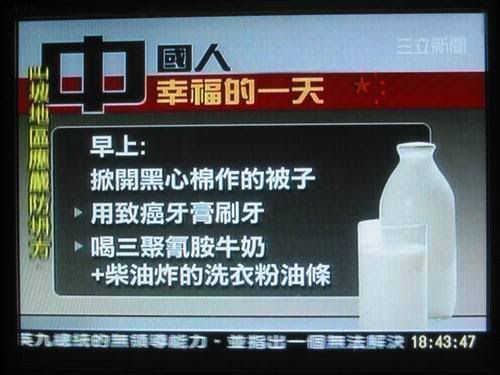
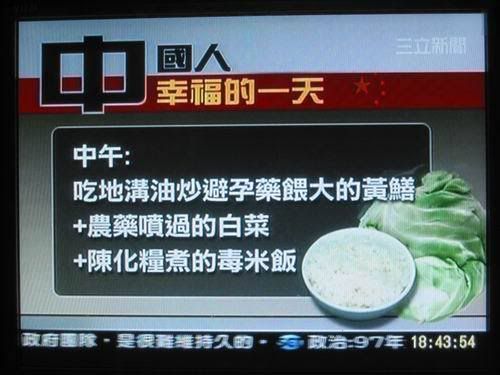
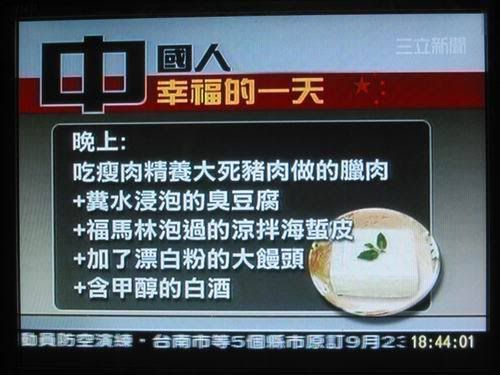
中國人練就一身五毒不侵金鋼之身,難怪中國人說〔中國一家強〕!




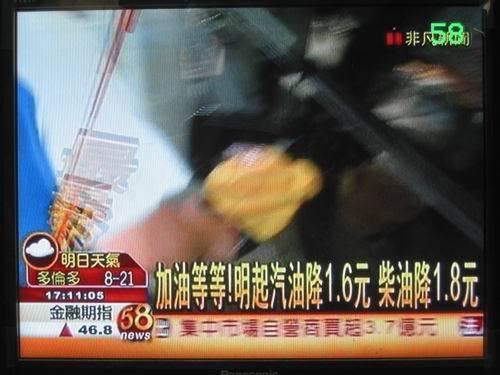



 ..
..
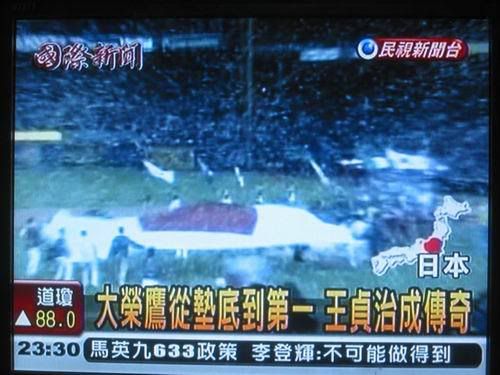
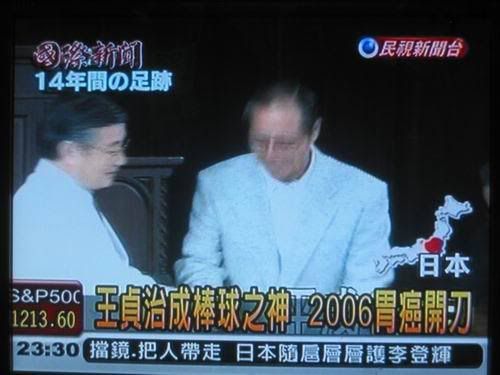

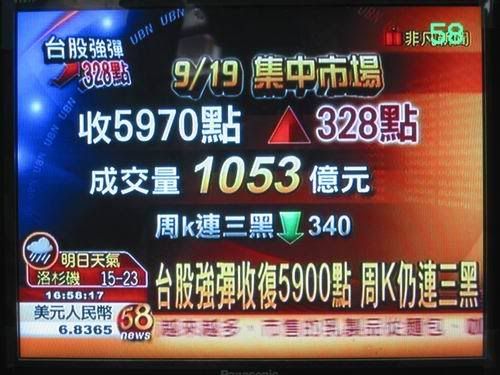
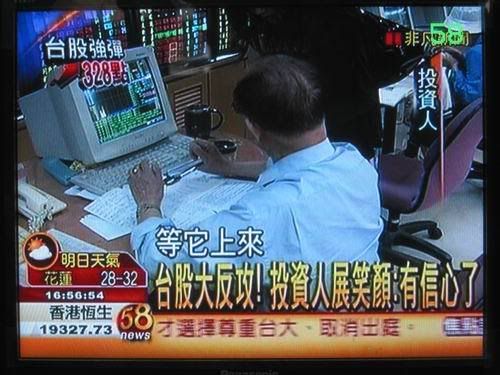
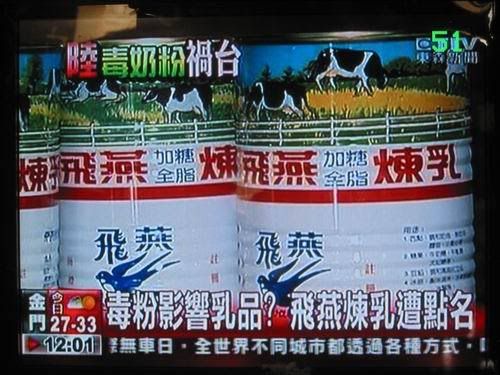
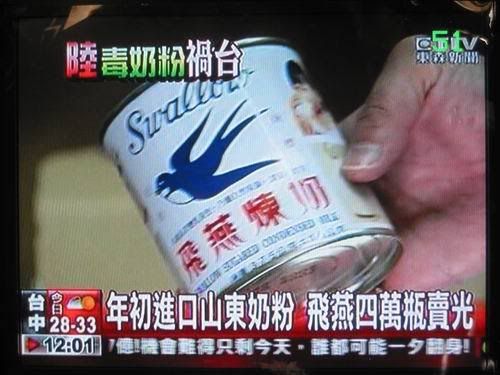



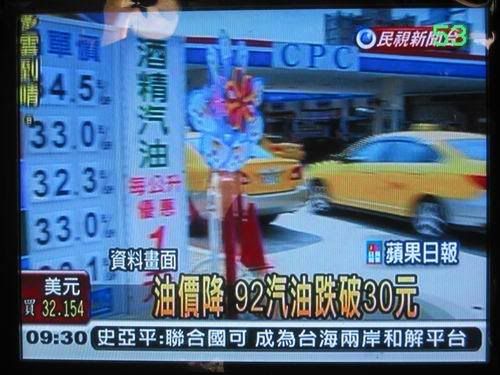
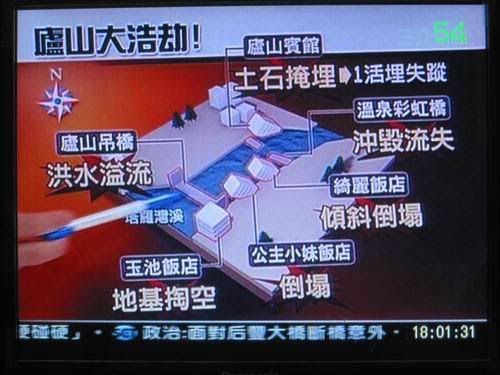
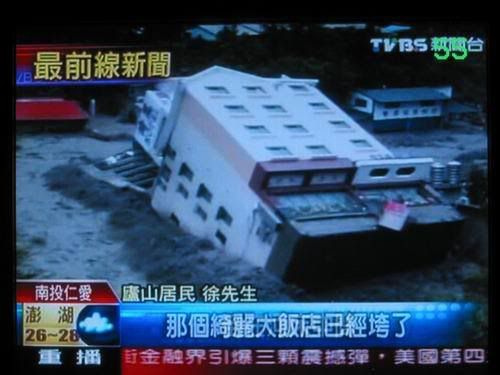





共
13
則